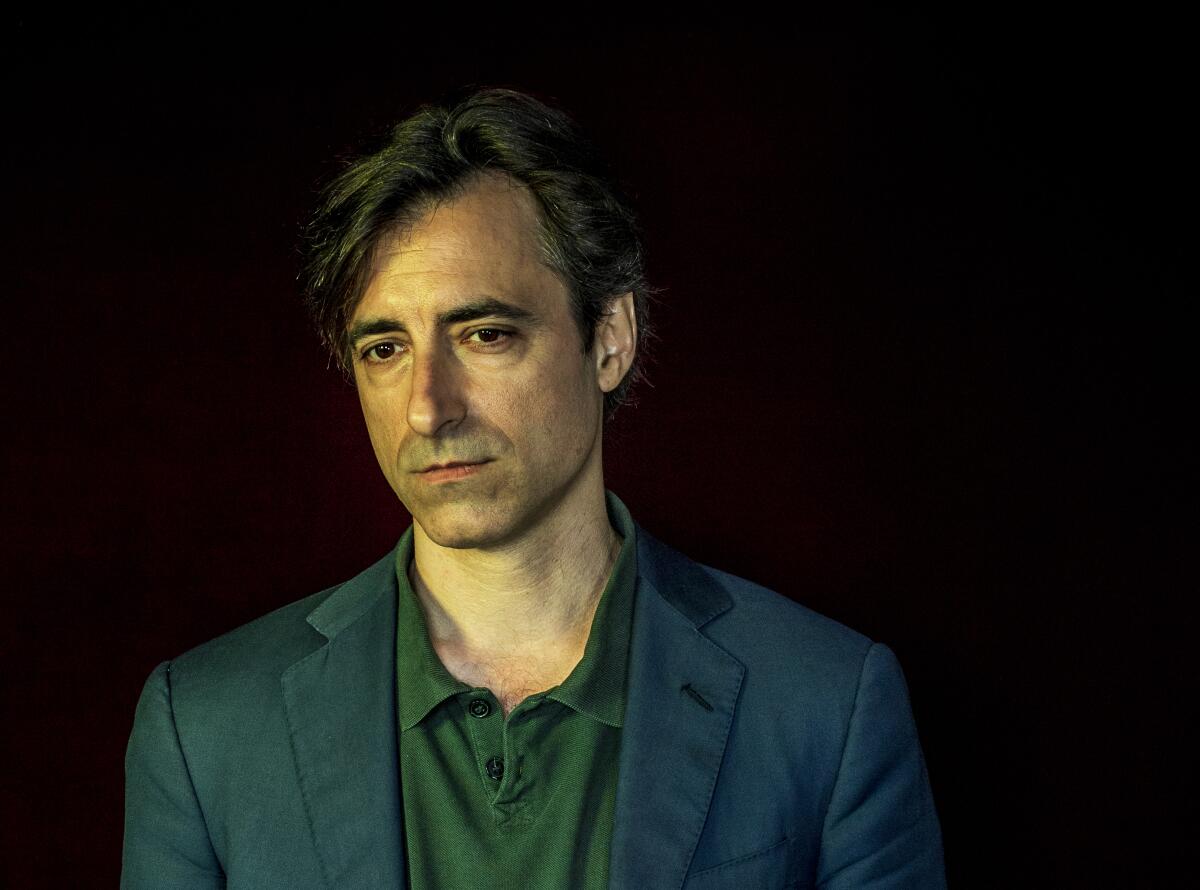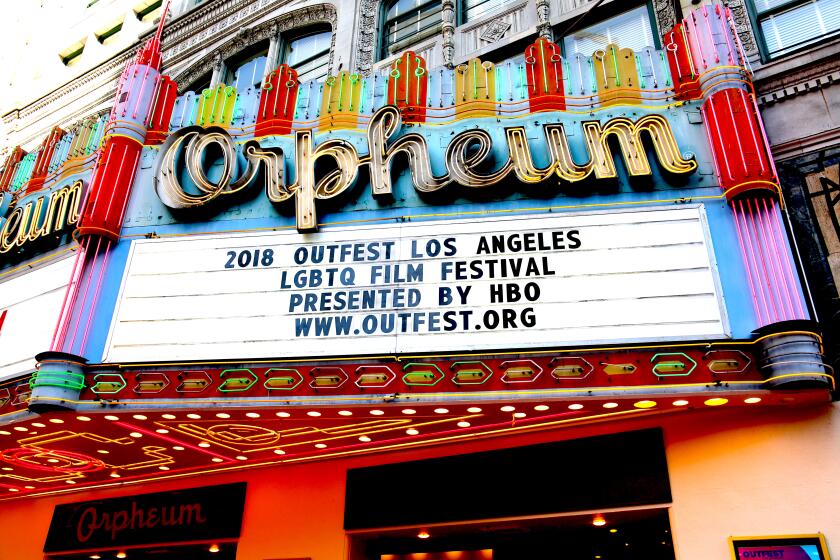How Noah Baumbach’s ‘Marriage Story’ became Netflix’s biggest Oscar hope yet
TELLURIDE, Colo. — Noah Baumbach wasn’t quite sure what time zone his body was in.
In the span of a few days, the writer-director had flown from New York to the Venice Film Festival, where his divorce drama “Marriage Story” premiered to acclaim, and then straight to the Telluride Film Festival. Now, on the morning of his movie’s first screening in the picturesque Colorado mountain town, he sat on the couch in his rented condo, feeling discombobulated.
“I was totally awake at, like, 5:30, which was bad because I went to bed after 1,” he said, his fingers wrapped around a cup of life-giving coffee. Soon, he’d be back on a plane again to take “Marriage Story” to the Toronto International Film Festival.
The nonstop travel, screenings, parties and interviews of the fall festival season can leave anyone feeling a little drained, but Baumbach has been buoyed by the rapturous reception “Marriage Story” has received so far. Critics have hailed the picture as the strongest work yet from the indie stalwart, whose 10 previous films include “Kicking and Screaming,” “The Squid and the Whale” and “The Meyerowitz Stories,” and a worthy addition the pantheon of classic divorce movies such as “Kramer vs. Kramer,” “Scenes From a Marriage” and “Shoot the Moon.” Oscar prognosticators expect the film to follow the bread-crumb trail of last year’s “Roma” to earn Netflix — which will release it in theaters Nov. 6 and via streaming Dec. 6 — another shot at a coveted best picture Oscar.
Through it all, Baumbach, 50, is just trying to keep his head on straight. “Staying off the internet is helpful,” he said dryly. “But at the same time, it’s always just nice when people like what you’ve done. You go into all of the movies with the same intention, which is just to make it as good as you can.”

By turns wrenching, tender and darkly comic, “Marriage Story” stars Scarlett Johansson and Adam Driver as Nicole and Charlie, a longtime couple with a young son whose marriage is coming apart. Despite their best intentions of having an amicable split, the two find themselves dragged into an increasingly messy divorce, as Nicole, who’s an actress, moves to Los Angeles with their child to work on a television pilot while Charlie, a theater director, insists on trying to keep the splintering family in New York.
Drawing in part from Baumbach’s own personal experience as both a child of divorce and a divorcé himself (he separated from actress Jennifer Jason Leigh in 2010 after a five-year marriage), “Marriage Story” delves into aspects of what he calls “the divorce-industrial complex” — emotional, legal, financial, parental — that are often hidden from view.
“It’s very interesting, for something that’s so common in our society, how little of the process is actually known,” said Baumbach. “It’s sort of happening under our noses. It’s both such a big subject on its own, and there’s so much that comes out during it that opens up all these other narrative possibilities.”

For the cast, Baumbach’s screenplay offered the sort of fertile dramatic terrain that actors live for, said Laura Dern, who plays Nicole’s tenacious divorce lawyer.
“I’ve never cried so hard over a script in my life,” Dern said. “I remember being 6, 7 years old, watching my mom, [Diane Ladd], on a movie with Scorsese, my dad, [Bruce Dern], on a movie with Hal Ashby, listening to the words, watching their collaboration, and going, ‘I want to do that thing.’ I read Noah’s script and said, ‘This is the kind of movie that made us want to make movies.’ ”
Though divorce has been a recurring theme in a number of Baumbach’s films — including 2005’s “The Squid and the Whale,” which earned him an original screenplay Oscar nomination — “Marriage Story” actually came out of an impulse to explore the subject of love. “For a long time, I’d been wanting to make a love story but I had no idea how to come at it,” said Baumbach, who is now romantically involved with director and actress Greta Gerwig, who co-wrote and starred in his 2012 film “Frances Ha.” “In looking at a couple breaking up, I sort of found this opportunity to tell a love story in its absence.”
While working on the script, Baumbach spoke with friends who’d been through marital breakups as well as divorce attorneys, judges and mediators. But the echoes of his own life are undeniable. Like Charlie, he is a director who was married to an actress, with whom he has a son. Though a dyed-in-the-wool native New Yorker (“I didn’t learn how to drive until I was 40”), he also has a place in L.A. and feels the tug of both cities.
As such, Baumbach is well aware that many viewers will wonder exactly how autobiographical “Marriage Story” is.
“I saw this interview with Philip Roth where he described his process as taking two stones of reality and rubbing them together so they spark the imagination,” he said by way of answering. “I related to that. I think most of my writing has begun that way. I like to know where I am, just as a way to start; I’ll go to a time in my life or a conversation, a place, a smell, a city. I understand it triggers that question. But, for me, it’s often a place to start, knowing that it’s an opportunity for transformation.
“I think the movies are masks in a way,” he continued. “I mean, I wouldn’t know how to go about telling a story from my own life exactly. Things are more autobiographical in places that people wouldn’t even think to ask about.”

Having worked with Driver on 2014’s “While We’re Young,” Baumbach knew even before he started writing “Marriage Story” that he wanted the actor to play Charlie. But when he first sat down with Johansson to discuss the project over lunch (the two had met years earlier at a performance of Pink Floyd’s “The Wall” by Roger Waters), he wasn’t sure if the actress — who at the time was going through her second divorce — would be interested.
“She started telling me what was going on, which I didn’t know, and I had this thought that she was either going to hate this or love this,” Baumbach said. “But she was so open to it right away. I respected that about her, that she was not concerned in any way. Maybe she saw it as an opportunity, because it was something that was close to her as well.”
That’s not to say that actually making the film wasn’t sometimes emotionally grueling — particularly in a climactic scene in which Charlie and Nicole air years of pent-up grievances in one blistering fight. The 10-minute scene was shot over two days and, given Baumbach’s propensity for shooting numerous takes, Johansson and Driver needed to repeatedly go to places of tearful anguish and uncontrollable rage.
“That was an incredibly rewarding thing to shoot and also a really tough thing to shoot,” Baumbach said. “I generally retain emotional distance from the material while I’m making it but I couldn’t keep distance from that. I would feel bad and I also felt very responsible for them because they exposed themselves so much.”
For his part, Driver relished the chance to keep trying to go deeper. “You got the luxury of 10, 15, sometimes more takes to explore and be surprised by the writing,” he said. “Good writing opens up your imagination to different ways of reading it. The script was so beautifully written, it was just a matter of not trying to put too much on top of it and just believing what you were saying.”
New Netflix movies by Noah Baumbach, Steven Soderbergh and David Michôd lit up Venice’s Lido before heading (briefly) to theaters and into the thick of awards season.
“Marriage Story” had initially been set up at Amazon Studios, but after the company pulled out of the project amid personnel changes, Netflix — which had released 2017’s “The Meyerowitz Stories” — quickly stepped in. “Netflix didn’t wait a heartbeat,” said “Marriage Story” producer David Heyman. “They loved the script and they believed in Noah. They have been incredibly supportive on all fronts.”
Having spent his entire career telling adult-oriented stories, Baumbach knows as well as anyone how difficult it can be these days to get people to leave their houses to see those types of movies. But, while he has expressed misgivings about the shift toward streaming that Netflix has propelled, he says he’s been encouraged by the company’s dedication to “Marriage Story,” which it’s giving a longer exclusive theatrical window than any film it has released so far.
“I’ve been fortunate to find people who’ve supported what I want to do, and I work at a budget level that doesn’t put undue pressure on them,” he said. “While it’s harder now in some ways, because of companies like Netflix there are also more opportunities for people. Yeah, I look at what’s in the theater and wish that there were more movies that were made for me. But when you know where to look, there’s always great and exciting stuff. So I don’t know. I’m figuring out where we’re all going as much as you are.”
Still, for Baumbach, nothing can replace the experience of sitting in a darkened theater, sharing an intimate film such as “Marriage Story” with a group of perfect strangers.
“In a theater, you’re vulnerable — you’re there, and it’s happening in front of you,” he said. “It also gives you the opportunity to give things a chance. Some of my favorite movies, maybe you don’t know right away what you think. Then, when you come to it, you love it that much more. Because, in a way, you found it.”
More to Read
Only good movies
Get the Indie Focus newsletter, Mark Olsen's weekly guide to the world of cinema.
You may occasionally receive promotional content from the Los Angeles Times.












